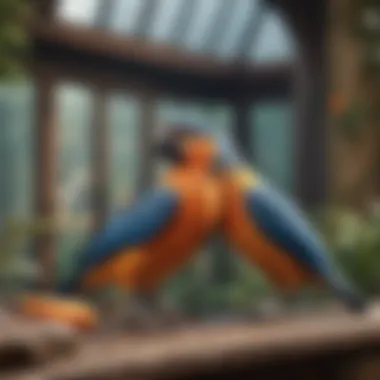Identifying the Best Pet Bird for Your Lifestyle


Intro
Choosing a pet bird can be a lifchanging decision, one that brings joy, companionship, and sometimes challenges. Bird ownership is unique among pets, requesting distinctive understanding and preparation. This is due, in part, to the diverse needs and personalities found across the many avian species. Understanding these aspects allows for finding the right fit for your lifestyle.
This article seeks to guide you through the critical aspects of assessing and nurturing your potential feathered friend, addressing critical factors from daily care routines to well-being checks and interaction needs. The insights within cater to both new pet avian owners and experienced enthusiasts who seek an enriching companion.
In this exploration, we will analyze the types of birds suitable for home life, emphasizing care tips, health essentials, behavioral insights, nutrition guides, and psycho-social stimulation methods. A well-informed decision will make pet ownership more pleasurable and sustainable.
In the succeeding sections, we will discuss the following:
Care Tips
Behavioral Insights
Nutrition Guides
Wellness and Health
Enriching Activities
Navigating the journey of finding and maintaining a pet bird doesn't have to be daunting. The right knowledge will empower your choices, ensuring a happy life for you and your avian companion.
Understanding Pet Birds
Understanding the unique characteristics and needs of pet birds is essential for anyone considering these captivating companions. Birds are distinct from traditional pets like cats or dogs, exhibiting behaviors and requirements that are different from more familiar animals. By comprehending these unique aspects, potential bird owners can make more informed decisions that cater to both their lifestyle and the bird's well-being.
Emerging as companions with their own personalities, birds require specific environments, diet, and care that matches their natural behaviors. Recognizing these factors allows for a stronger bond between owner and pet, paving the way for a fulfilling companionship.
The Unique Nature of Birds as Pets
Birds offer a fascinating alternative to the conventional pet choices often seen. Their capacity for vocal communication, intelligence, and playful interactions attracts people seeking a closely engaging pet experience. Each species displays a unique set of behaviors, making the exploration of these traits crucial when identifying the best pet bird for your circumstances.
Avian Behavior
Birds thrive on social interaction and environmental enrichment. They express their emotional range vocally and through body language. Observing and interpreting these signals provides insight into their mood and needs. Unlike other pets often content with cohabitation, many birds seek active participation from their owners in daily activities. This means consistent engagement and attention to foster behavioral health.
Social Dynamics
Some species are extremely social and form strong bonds with humans. Parrots, for example, enjoy spending time outside their cages and learning cues from their owners. Such interactions not only enrich the bird's life but also result in a rewarding, interactive relationship for both parties. Infusing their cage with toys and engaging in regular play can satisfy their social instinct and curb behavioral issues.
Common Misconceptions About Pet Birds
Many misconceptions surround the ownership of pet birds. Understanding these false ideas is essential for a knowledgeable perspective before adopting an avian friend. Highlighting them can demystify bird ownership and prepare prospective owners for what to expect.
“Birds are not pets that can be left unattended. They require daily interaction and mental simulation.”
Independence vs.
Dependency
A common belief is that birds are truly independent and require little input from their owners. In reality, birds demand a diverse mental and physical stimuli to avoid becoming bored or developing detrimental behaviors. They thrive in an interactive setting, and neglect can lead to stress and health concerns.
Size Equals Difficulty
Another myth assumes that smaller bird species, such as canaries, are easier to manage than larger species like African Grey parrots. Size can influence care requirements, but conlabeling an entire range based solely on size oversimplifies the variability in temperament and behavior within species. Prospective pet bird owners should consider each species individually based on their characteristics, rather than generalizing simply based on size.
Vocalizations
Many believe that all birds are excessively noisy. While some species, such as cockatiels and parrots, can make loud sounds, others, like finches, are relatively quiet. The noise levels of pet birds can be more manageable than the initial assumption suggests, but understanding this aspect's requirements can temper expectations among first-time owners.


In summary, appreciating the unique nature of pet birds begins with an acknowledgment of their distinct behavioral needs and debunking widespread misconceptions. This foundational understanding sets the stage for a rewarding and informed pet ownership experience.
Factors to Consider When Choosing a Pet Bird
Selecting the right pet bird requires careful deliberation. The journey of bringing a bird into your home transcends mere preference; it is a significant decision that encompasses multiple personal factors. Various characteristics of bird species can profoundly impact the long-term compatibility with owners, making it imperative to assess your situation thoroughly. Understanding what constitutes a fitting pet bird involves evaluating size requirements, noise levels, social temperament, and dietary stipulations. This structured analysis can introduce clarity and help in making informed decisions, ensuring your choice aligns harmoniously with your lifestyle.
Size and Space Requirements
When contemplating a pet bird, it is essential to consider the size of the bird and the associated space requirements. Different species have unique space needs based on their size and activity level.
- Larger birds like African Grey Parrots require spacious cages that offer room for movement. Conversely, smaller birds such as Canaries may thrive in comparatively less space.
- The cage should not only suffice in stark dimensions but also provide complex environments with perches, toys, and room for flight, to help sustain an active and engaging lifestyle.
Access to wide areas for social interaction and exercise significantly enriches avian well-being. Failing to provide adequate space can lead to behavioral issues and stress in birds, compromising their health and happiness. Therefore, prior knowledge of your home’s layout and the bird's environmental preferences can assist in making a sound selection.
Noise Levels and Temperament
Birds exhibit diverse noise levels and temperament. This disparity can render specific species unsuitable for some homes. Factors like your lifestyle, neighbors, and other occupants should weigh in heavily on your choice of bird.
- For instance, Cockatiels have a calmer demeanor compared to a Budgerigar, which can often be louder and more social.
- If you frequently entertain guests or have particularly modest dwelling confines, selecting a quieter bird may be prudent.
An awareness of both expected liveliness and noise is requisite. Understanding that certain excellently-socialized birds engage in lively vocalizations can lead to enjoyable, interactive companionship. Otherwise, the enduring sounds may feel overwhelming to some consumers. Observing various bird species in communal spaces or through avian-centered platforms, such as reddit.com, can deliver distinct insights.
Dietary Needs and Maintenance
The proper dietary requirements and maintenance of a pet bird are fundamental elements for its long-term health. Each species holds distinctive nutritional needs that an owner must cater to adequately.
- Lovebirds, for example, benefit from a diet-heavy in diverse fruits, vegetables, and quality pellets. In contrast, Canaries have distinct preferences leaning towards seeds and fresh greens.
- Regular feeding schedules, proper caging arrangement, and frequent cleaning habits ensure not just physical health but also psychological vitality for ideal prospects.
Being aware of bird care standards also encompasses recognizing potential allergies, fresh feeding, and keeping aviaries hygienic. Education from comprehensive resources, including links like britannica.com, can bolster understanding tailored for influencing personal choices.
Popular Pet Bird Species
The choice of the right species of pet bird holds significant importance in this article. Understanding the various species enables potential owners to select a bird that fits their lifestyle and desired companionship type. Factors such as behavior, care needs, and social characteristics influence how enjoyable the pet-bird experience will be. Exploring popular pet bird species allows individuals to make informed choices that can lead to a rewarding relationship with their feathered friends.
Canaries
Behavior and Characteristics
Canaries are well recognized for their melodious songs and vibrant colors. One key characteristic is their less demanding temperament, making them a suitable choice for those who prefer a quieter bird. Their singing ability is appealing for many and can create a pleasant atmosphere in the home. This species thrives in solitude and does not require constant social interaction, which can be beneficial for busy individuals.
One unique feature of canaries is their varied song patterns, which can differ significantly among individuals. This diversity means that each canary can bring its own distinctiveness to an owner’s experience. However, it's important to note that they may not respond to handling or training like more social birds, which can limit interactive experiences.
Care Requirements
Canaries require specific care that includes proper cage size, diet, and humidity levels to remain healthy. A key element is ensuring a spacious cage equipped with perches and toys relevant to their size. These requirements reflect their need for space to move and engage comfortably.
Another unique aspect of canary care involves their diet. They thrive on a balanced diet of seeds, fruits, and greens. Any deficiency can lead to health issues. Owners must also account for cage cleaning and upkeep, as cleanliness will influence the bird's well-being.
Budgerigars (Budgies)
Social Nature and Intelligence
Budgerigars, or budgies, are well-regarded for their social nature and heightened intelligence. A notable characteristic of budgies is their sociable demeanor. They are highly interactive, forming strong bonds with their owners. This attribute marks them as an excellent choice for individuals looking for engaging pet relationships.
One unique aspect of budgie intelligence is their ability to learn tricks and mimic sounds. This enhances the bond with owners while providing mental stimulation for the bird. However, their social needs require owners to spend significant time with them; otherwise, they may develop behavioral problems.
Training and Interaction
Training Budgerigars can be both enjoyable and rewarding. Their playful nature makes them receptive to learning, which adds a facet of interaction to their ownership experience. A prominent characteristic of training is that they respond well to positive reinforcement techniques, such as treats and praise, which encourages obedience.


Moreover, the unique feature of interactivity enhances the bond between bird and owner. Training sessions can provide mental stimulation, which is beneficial for their psychological health. However, without proper engagement, lack of mental stimulation can lead to boredom, resulting in destructive behavior.
Cockatiels
Affectionate Behavior
Cockatiels are celebrated for their affectionate behavior. Their friendly nature enables them to quickly bond with their human companions, defined by chirps, vocalizations, and preening. This sociability endears them to many avian enthusiasts, rendering them a popular choice.
What stands out with cockatiels is their ability to express affection through physical contact and even dance to rhythms. This unique feature distinguishes them from other birds, increasing their appeal to pet owners. However, while they thrive on social interaction, without it, they may become withdrawn.
Living Environment Needs
Proper living environment considerations are essential for cockatiels. They require ample cage space, typically with sturdy perches and toys, to keep them engaged. A key characteristic of their habitat requirements includes a need for both horizontal and vertical space for flying and climbing.
Also, their sensitivity to temperature demands attention. Maintaining a stable and comfortable environment can prevent stress and promote overall health. Not meeting these needs can lead to behavioral issues and health problems, emphasizing the importance of meeting environmental demands.
Lovebirds
Social Dynamics and Bonding
Lovebirds are aptly named for their sociable and bond-forming nature. They are intelligent and affectionate, making them a compelling choice for individuals desiring strong human-animal connections. One defining characteristic is their ability to create profound emotional attachments with their owners as well as with other birds, often demonstrating a noticeable preference for companionship.
A unique aspect of their bonding behavior includes their need for companionship to prevent loneliness. This highlights their advantage of being highly interactive. However, understanding their intrinsic needs can be complex, as their social dynamics may lead to potential jealousy if not properly managed.
Care Tips for Lovebirds
Caring for lovebirds requires specific attention due to their need for social interaction and mental stimulation. A fundamental characteristic of their care needs encompasses proper diet and appropriate space. They should be provided with a varied diet, including species-specific pellets, seeds, and nutritious fruits and vegetables.
Another consideration involves environmental stimulation. Lovebirds appreciate opportunities to forrage, chew, and interact with safe objects within their cage. Owners must ensure that their living space has a variety of toys designed to engage their curiosity, otherwise, lovebirds may develop behavioral issues due to boredom.
African Grey Parrots
Cognitive Abilities and Interactions
African Grey Parrots are widely known for their advanced cognitive abilities and vivid personality traits. One of their key characteristics is their exceptional capacity for learning, including the ability to mimic human speech and sounds accurately. This cognitive strength makes them engaging companionship choices, as owners may enjoy conversations, adding novelty to pet ownership experiences.
The ability to problem-solve is another unique feature of African Grey Parrots. They thrive on challenges and intellectual stimulation, which differentiates their care requirements from simpler species. These stimulating demands necessitate a dynamic and enriching environment, catering to their expansive intelligence.
Environmental Enrichment
Providing adequate environmental enrichment for African Grey Parrots involves creating activity-based spaces that incudes toys, puzzles, and changed locations to stimulate exploration. A distinctive feature is incorporating changes in surroundings, such as rotating toys or re-arranging perches regularly. This strategy avoids boredom and ensures the birds remain engaged.
Maintaining environmental enrichment poses advantages in reducing stress and fostering mental health. However, meeting their high-demand needs may require significant time and effort from the owner, emphasizing the potential challenges of caring for such an intelligent bird.
Understanding each species thoroughly empowers prospective bird owners to make responsible and informed choices.
Evaluating Your Lifestyle and Commitment
Choosing a pet bird requires deep evaluation of one’s lifestyle and commitment. This section emphasizes how essential it is to align the species of bird with potential owners' daily rhythms, obligations, and expectations. Birds can offer companionship and joy, but specific considerations can impact their well-being. Each aspect plays a factor in ensuring the happiness of both the bird and the owner.
Time Investment for Care
The care of pet birds often requires a misunderstunding of practical needs. Birds need daily attention to thrive emotionally and healthily. This includes not just feeding and cleaning, but also playtime and social interaction. Potential bird owners should be aware of how many hours per day they can dedicate.
- Feeding routines: Most birds need fresh food one or two times a day.
- Interaction: Birds like daily social interaction to avoid behavior problems.
- Grooming necessities: Regular bathing, feather maintenance, and health check-ups are vital.
For example, larger parrot species like African Grey Parrots demand significant time for mental stimulation and companionship while smaller birds, such as finches, might require less intensive attention. Understanding these time dynamics can help establish a nurturing home for new pet birds.
Handling Behavioral Issues


Every bird has its character and behavioral patterns. These can be delightful, yet are not without challenges. Newly acquired birds may undergo stress and demonstrate unwanted behavior, which requires careful management to cultivate a harmonious household.
- Understand your bird: Spending time observing can lead to better comprehension of their signals and needs.
- Behavior training: Learning to apply positive reinforcement helps steer unwanted actions.
- Professional help: Engaging a bird behavior specialist may sometimes be necessary for persistent issues.
Developing an appropriate approach might reduce conflicts and increase enjoyment of the relationship you build with your parrot or canary.
Travel and Housing Considerations
Consideration of plan falls under major pet ownership responsibilities. Those intent on acquiring a pet bird need to think thoroughly about how travel, vacations, or sudden relocations might affect the bird's life.
- Travel constraints: Some birds may not adapt well to travel and will require consistent, familiar environments; think about how often you leave home.
- Housing arrangements: Ensuring safe and sufficient housing for your bird is crucial. Make certain you arrange your abode so it rings “family-friendly,” properly securing areas tagged off-limits and checking that the environment is devoid of hazardous items.
- Emergency plans: Draft emergency plans, like trustworthy individuals or pet care services if you ever need to leave your home.
Connecting with Your Pet Bird
Connecting with your pet bird is vital for fostering a harmonious relationship. Understanding how to create meaningful interactions greatly enhances both your life and your bird's. A well-bonded bird is likely to be less stressed, more social, and exhibit better mental health. Establishing this connection requires time, patience, and knowledge about your bird’s needs and behaviors. With a good foundation in this area, pet owners can mitigate behavioral problems and even improve overall quality of life for their birds.
Establishing Trust and Bonding
Building trust with your pet bird is a gradual process that shapes communication, interaction, and emotional support. The initial stage involves an assessment of your bird’s personality and predisposition to form attachments. Many birds may take time to feel comfortable, especially when entering a new environment.
Key aspects in establishing trust include:
- Gentle Approach: Avoid abrupt movements when around them; this can frighten your bird.
- Consistent Presence: Spend time near their cage, engaging in calming conversation and observing their behavior.
- Interaction with Treats: Use healthy treats as a reward for progress; this encourages positive association.
The goal is to create a safe environment where the bird feels comfortable enough to explore its surroundings. Over time, its reluctance may give way to curiosity, pushing toward the development of a strong bond. It is also advantageous to familiarize yourself with different breeds’ bonding styles, as these can vary significantly.
Understanding Bird Behavior
Understanding avian behavior is crucial for any bird owner. Birds exhibit a variety of natural behaviors that might seem confusing at first. Taking the time to learn how birds communicate is beneficial in establishing rapport and preventing misunderstandings. Often, bird interactions consist of body language and vocalizations.
Observe for signs such as:
- Feather Ruffling: This can indicate relaxation or agitation.
- Beak Grinding: Often a sign of contentment.
- Vocalizations: While some chirp as part of socialization, others may holler out of distress.
Engaging in observation goes hand in hand with understanding behaviors. Birds often mimic what they perceive as safe, so creating a stable and enriching environment will support their comfort levels. This also aids fear-reduction methods in scenarios with unusual noises or shapes in their vicinity.
Enriching Your Bird's Environment
Creating an enriching habitat for your pet bird supports mental stimulation and physical health. Birds are curious creatures that thrive on interaction, toys, and exploration opportunities. An uninspiring environment can lead to boredom and behavioral issues like feather plucking or constant screeching.
Consider these elements to enrich their space:
- Toys: Rotate them regularly to stave off monotony; different textures and colors keep avians active.
- Perches and Swings: Provide several sizes and heights to mimic their natural environments.
- Vision and Auditory Stimulation: Place their cages where they can see outside or watch family activities, but avoid excessive sound distractions.
Appropriate stimuli greatly contribute to keeping birds engaged and happy. By prioritizing an enriched environment, owners can observe a noticeable improvement in their pet's attitude and temperament. In the long run, a strong connection through trust, understanding, and environment design leads to a rewarding relationship crucial for both the bird and the owner.
Finale: Making Informed Choices
Choosing a pet bird involves various considerations, which are not to be taken lightly. This article emphasizes the significance of making informed choices. Pet birds have unique traits and demands that differ from other animals. Thus, understanding these aspects can lead to a fulfilling experience for both the bird and the owner. An informed choice results in better care, a stronger bond, and healthier living conditions for your avian companion.
Summary of Key Considerations
In choosing a pet bird, several key considerations must be kept in mind:
- Species Characteristics: Different birds have distinct behaviors and temperaments. Some birds may require more social interaction than others, while others may be more independent.
- Space and Environment: Evaluate your living space and how it caters to varying birds' requirements. Larger species typically need more room to roam and fly.
- Time Commitment: Birds often have long life spans. It is crucial to understand the level of care and daily engagement that certain species will demand.
- Potential Challenges: All pets have behaviors that can be problematic. Being aware of this before bringing a bird home helps in managing expectations and enhancing cohabitation.
As you think about adding a bird to your life, weighing these factors is crucial. They can influence not just the health of your bird but the harmony of your household.
Encouragement for Further Research
Before deciding on a specific bird species, thorough research is helpful. The world of birds is vast and diverse. Online resources like Wikipedia, or discussions on forums such as Reddit provide valuable insights into various types of birds.
Explore literature that explains the social structures of pet birds. Some journals and books dedicate their content to advances in birdkeeping, which can provide deeper knowledge. Additionally, connect with local bird clubs or breeders. Engaging in discussions will enrich your understanding of potential species suitability.
Ultimately, being well-informed tags along as a responsibility towards the life you choose to care for. Engaging in research opens a door to thoughtful selection that maximizes the joy both you and your future pet will experience.















